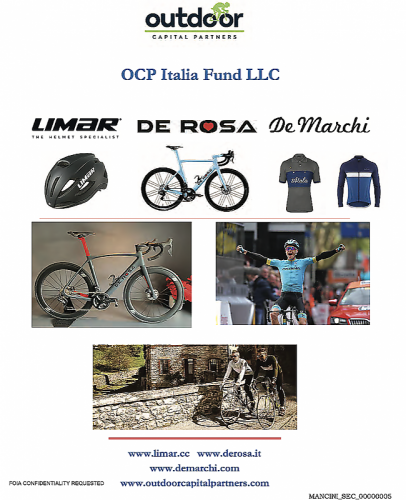NEWARK, N.J (BRAIN) — Victims of what prosecutors call a “Ponzi-like” scheme to buy several Italian cycling brands are asking a judge to release pre-sentencing materials for Samuel Mancini, who has pleaded guilty to securities fraud in the case.
Mancini pleaded guilty in April 2022, but a sentencing hearing has been repeatedly postponed and is currently not scheduled; however, the recent pre-sentencing filings suggest the court will soon set a date.
The materials were submitted by the defense and prosecutors; they include history and other information that Judge Claire C. Cecchi will review in determining a sentence for Mancini. The sentence could include prison time and restitution.
New York attorney Karl Buch represents nine victims in the case, all members of a Colorado group that invested several million dollars in the company. The group has previously written letters to the court expressing concerns about the sentencing delays. This week the group wrote to the court to request access to the materials, which are not on the public docket.
“My clients want to see justice done and for the court to impose both restitution and an appropriate prison sentence for Mr. Mancini,” attorney Karl Buch told BRAIN.
Federal sentencing guidelines suggest Cecchi could impose a prison term of 4-6 years but she has discretion to impose little or no prison time.
Under the plea agreement, Mancini agreed to plead guilty and to pay restitution, although the exact terms of the restitution were not set at the plea hearing and may be determined at the sentencing hearing. One alleged victim was present at the plea hearing last April and Buch said his clients may speak at the sentencing hearing.
Background
Mancini was arrested in July 2021 and charged with criminal securities fraud, wire fraud and money laundering. He also is being sued in a civil case by the Securities and Exchange Commission on related charges. The SEC case is paused until the criminal case is concluded.
Prosecutors charged that Mancini, then managing director of Outdoor Capital Partners, raised over $11 million from about 40 investors in a plan to acquire De Rosa Cycles, De Marchi Apparel, Limar Helmets and Gruppo Srl, the parent of Cinelli and Columbus. None of the acquisitions was completed and several investors said they were unable to recover all their funds from Mancini
Besides the Colorado group represented by Buch, another major investor was Riolee LLC, a Florida-based fund that invested $5 million with Mancini earmarked for the acquisition of DeRosa. The manager of that fund has declined to comment to BRAIN until after sentencing.
Limar deposit at issue
The sentencing delay may be partly explained by an effort by Mancini’s public defender to recover 2.8 million euros (about $2.9 million) that the company sent to the owners of Limar as partial payment for an acquisition that was never completed.
Limar has declined to comment on the case. The company set up its first U.S. office last year.
In May, Timothy C. Donahue, Mancini’s Federal Public Defender, sent a letter to Assistant U.S. Attorney James Graham, the prosecutor, asking for assistance in recovering the money from Limar. He also filed the letter with the court.
According to Donahue’s letter, Limar intends to return the funds, which would defray some of the restitution that Mancini’s plea agreement requires him to pay to alleged victims
Donahue told Graham that Limar’s attorney in Italy is demanding “A settlement agreement governed by Italian Law and subject to the Italian Jurisdiction,” in which Mancini would waive any claim against Limar. Limar’s attorney also wants the payment made to an account controlled by the court or indicated by court order, and for the Securities Exchange Commission to be informed of the matter and give assurance that it has no objections.
“The return of the money (a)ffects the restitution amount that will be owed by Mr. Mancini as a result of his guilty plea and we therefore request that steps be taken to secure the money prior to proceeding to sentencing in this case,” Donahue wrote.
Graham responded, opposing further sentencing delays and declining to assist in recovering the funds.
“Like any case involving restitution, a restitution order will be entered that reflects the amount Mr. Mancini owes to his victims. If at the time of sentencing the €2.8 million remain in Italy, that amount will be included in the restitution total. If and when the €2.8 million are released and returned to the victims, the restitution number will be reduced accordingly,” Graham wrote.
“With respect to your request for assistance in recovering the Funds,” Graham wrote, “the Office is not in a position to take the steps requested in your letter nor does it have an obligation to do so.“
Mancini was originally represented by Matthew Beck of the New Jersey firm Chiesa Shahinian & Giantomasi. In July last year Beck withdrew from the case after Mancini became unable to pay. The court appointed a federal public defender who handled the case until December last year and was then replaced by Donahue. The attorney changes may have contributed to the sentencing delays.


